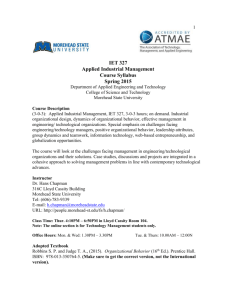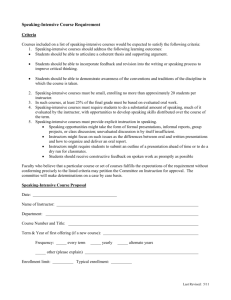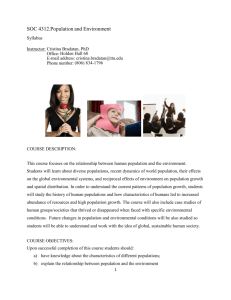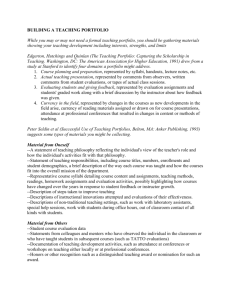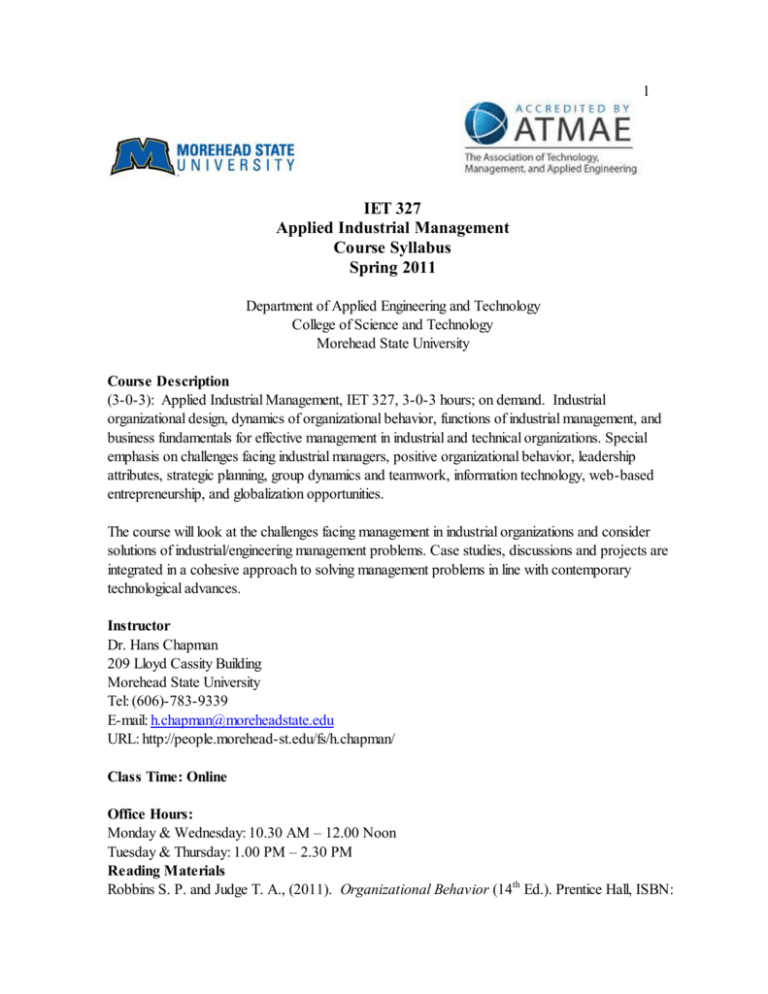
1
IET 327
Applied Industrial Management
Course Syllabus
Spring 2011
Department of Applied Engineering and Technology
College of Science and Technology
Morehead State University
Course Description
(3-0-3): Applied Industrial Management, IET 327, 3-0-3 hours; on demand. Industrial
organizational design, dynamics of organizational behavior, functions of industrial management, and
business fundamentals for effective management in industrial and technical organizations. Special
emphasis on challenges facing industrial managers, positive organizational behavior, leadership
attributes, strategic planning, group dynamics and teamwork, information technology, web-based
entrepreneurship, and globalization opportunities.
The course will look at the challenges facing management in industrial organizations and consider
solutions of industrial/engineering management problems. Case studies, discussions and projects are
integrated in a cohesive approach to solving management problems in line with contemporary
technological advances.
Instructor
Dr. Hans Chapman
209 Lloyd Cassity Building
Morehead State University
Tel: (606)-783-9339
E-mail: h.chapman@moreheadstate.edu
URL: http://people.morehead-st.edu/fs/h.chapman/
Class Time: Online
Office Hours:
Monday & Wednesday: 10.30 AM – 12.00 Noon
Tuesday & Thursday: 1.00 PM – 2.30 PM
Reading Materials
Robbins S. P. and Judge T. A., (2011). Organizational Behavior (14th Ed.). Prentice Hall, ISBN:
2
978-0-13-612438-2
Supplementary Reading Materials
1. Chang C. M., (2005). Engineering Management Pearson-Prentice Hall, ISBN: 0-13144678-9
Luthans F., (2008). ). Organizational Behavior (14th Ed.). McGraw Hill, ISBN:
Course Objectives
Upon successful completion of this course, the student will have gained the following competencies:
1. Understand the Organization Behavioral Perspective. (Evaluated in Exam 1, online discussions,
and Final Exam)
Describe the major challenges and paradigm shift facing management
Explain the Hawthorne studies and its relationship as the starting point of modern
organizational Behavior.
2. Understand Positive Organizational Behavior. (Evaluated by Exam 1 and final exam.)
Explain the theory, research and application of self efficacy
Explain the specific roles that emotion and intelligence play in emotional intelligence.
3. Understand Diversity and Ethics. (Evaluated by Exam 1, online discussion, and final exam.)
Discuss the meaning of ethics and the major factors of ethical behavior
Describe major areas of ethical concern, including “bottom-line” impact and specific issues
such as sexual harassment and privacy.
4. Understanding of Attitudes and their relation to Job Satisfaction. (Evaluated by Exam 2 and final
exam.)
Describe the meaning of attitudes and their emotional, information, and behavioral
components.
Describe the application of goal setting to overall systems performance
5. Understand Motivational Needs and Processes. (Evaluated by Exam 2 and final exam.)
Discuss the major content theories of work motivation
Explain the contemporary equity and organizational theories.
6. Understand Information Technology and Globalization and its impact on Organizational Behavior.
(Evaluated by exam 1 and Final Exam)
Describe the developments in knowledge management and human capital/intelligence.
Describe the role and dimensions of culture as a context for international behavior
7. Understand Group Dynamics and Team formation. (Evaluated by real case studies assignments,
Exam 2 and final exam.)
Describe how the difference between a group and a team.
3
Discuss the various types of teams and their importance in an organization.
8. Understand Design and Structure. (Evaluated by real case studies assignments, Exam 2 and final
exam.)
Describe how an organizational design is maintained.
Explain the importance of organization structures, hierarchies and chain of command.
9. Understand Effective Leadership Processes. (Evaluated by final exam.)
Explain the traditional theories of leadership, including the trait, group and exchange,
contingency and path goal approaches.
Identify modern theoretical processes for leadership, such as charismatic, transformational,
social cognitive, substitutes, and now authentic leadership.
10. Understand Globalization, Information Technology, and the roles of engineers and technologists
in global organizations. (Evaluated by online discussion, and final exam.)
Explain the difference between a leader and a manager.
Discuss the role that engineers and technologies play in organizations.
Assessments
1. Exams
There will be two (2) exams during the semester and a FINAL EXAM. There will be no makeup
exams. There is no substitute for any exams. Should a student need to miss an exam, the instructor
must be consulted beforehand. Otherwise, it is not accepted and the student will not receive any
credit for that exam. The only legitimate reason to miss an exam is death in the immediate family or
medical condition such as surgery.
2. Individual Assignments / Projects
The students will be given six (6) individual projects. Each has to be submitted on the specified due date.
There will be one grading scale deduction from the assignment total grade for any late submission within
the first week after the due date. No late submission will be accepted beyond the first week after the due
date and a grade of zero will be recorded. The only legitimate reason for missing an assignment is death
in the immediate family or medical condition such as surgery.
3. Group Projects (Case Studies)
Case studies will be assigned for group project. These case studies are given to the groups without
previous notification. Groups will complete the given case study and present their work in class. There in
no substitution for these activities. It is extremely important that students attend all the class sessions.
Should a student need to miss class, the instructor must be consulted beforehand. The only legitimate
reason is death in the immediate family or medical condition such as surgery.
4
Students will use the Harvard Case Study method to resolve all assigned cases. The six step Harvard
Case Study process is:
1. Define the problem
2. Describe the facts of the case
3. List alternatives
4. Analyze the alternatives
5. Formulate a conclusion
6. Make recommendations
4. Online Home Page:
The students are to complete their home page in Communication section of Black board. They should
complete all the sections in the home page, except for the favorite website. The due for this requirement
is by the end of the second week of the semester.
5. Portfolio
Students are to prepare a portfolio including all the assignments, exams, reports, etc. that they have
submitted and for which they have received credit. This portfolio will include a table of content, a copyof
the syllabus, all the assignments, exams, reports, etc. In addition, each student will write a paragraph or
two evaluating the course, its contents, delivery, etc. and will add it to the portfolio. The due for the
portfolio is one week prior to the final exam day.
Evaluation
Activity
Points
Syllabus Quiz
10
Home Page
10
Discussion Board
100
Individual Assignments (6)
300
Group Project
100
Exams 1
100
Exams 2
100
Portfolio
30
Final Exam
250
Total
Note:
1000
90-100% = A
Percentage
1%
1%
10%
30%
10%
10%
10%
3%
25%
100%
80-89% = B 70-79% = C 60-69% = D Below 60% = E
5
ACADEMIC HONESTY
Cheating, fabrication, plagiarism or helping others to commit these acts will not be tolerated.
Academic dishonesty will result in severe disciplinary action including, but not limited to, failure of the
student assessment item or course, and/or dismissal from MSU. If you are not sure what constitutes
academic dishonesty, read The Eagle: Student Handbook or ask your instructor. The policy is
located at http://www.morehead-st.edu./units/studentlife/handbook/academicdishonesty.html.
For example: Copying information from the Internet is plagiarism if appropriate credit is not given.
POLICY for ACCOMMODATING STUDENTS with DISABILITIES
Professional staff from MSU Academic Services Center (ASC) coordinates efforts to address
accessibility needs and class accommodations with instructors of students who have learning or
physical disabilities. Faculty will cooperate with the ASC staff to accommodate the needs of students
taking departmental courses.
CAMPUS SAFETY STATEMENT
Emergency response information will be discussed in class. Students should familiarize themselves
with the nearest exit routes in the event evacuation becomes necessary. You should notify your
instructor at the beginning of the semester if you have special needs or will require assistance during
an emergency evacuation. Students should familiarize themselves with emergency response
protocols at www.moreheadstate.edu/emergency.
6
COURSE OUTLINE
Applied Industrial Management (IET 327)
WEEK 1 & 2
Date_
1/18
1/24
WEEK 3 & 4
Lecture
Reading
Course Introduction
Syllabus Quiz and Homepage assigned
Intro. to Organizational Behavior
Syllabus Quiz due
IP 1 and DB 1 assigned
Ch. 1
Date
1/31
2/7
WEEK 5 & 6
2/14
2/21
3/21
Globalization and Leadership
IP 5 and DB 5 assigned
Reading
Positive Organizational Behavior
Homepage due, IP 1 due,
IP 2 and DB 2 assigned
Diversity in Organizations
IP 2 and DB 2 due
DB 3 assigned
2/28 Understanding Work Teams
Ch. 2
Ch. 10
IP 3 due
IP 4 and DB 4 assigned
Ch. 9
3/7
WEEK 9 & 10
3/14
Lecture
WEEK 7 & 8
EXAM 1 (2/14/11)
Teams assigned for Group Projects
Foundations of Group Behavior
Assignment 3 (Group Report Writing)
SPRING 2011
Organizational Design and Structure
IP 4 and DB 4 due
Ch. 15
WEEK 11 & 12
Ch. 12
SPRING BREAK
IP 5 and DB 5 due
3/28
EXAM 2 (3/29/11)
Group Project assigned
4/4
Information Technology
Preliminary Group Project Reports due
WEEK 13 & 14
WEEK 15 & 16
4/11
Engineers and Technologists as Managers
IP 6 and DB 6 assigned
4/25
Final Project Presentations
Electronic Portfolio Assigned
4/18
Challenges for Engineering/Technological
Managers
IP 6 and DB 6 due
5/2
Course Overview (Review for Final Exam)
Electronic Portfolio Due
IP = Individual Project DB = Discussion Board GP = Group Project
Final Exam: Monday, May 9
NOTE: This syllabus is subject to change at the discretion of the instructor to
7
accommodate student and/or instructional needs.


